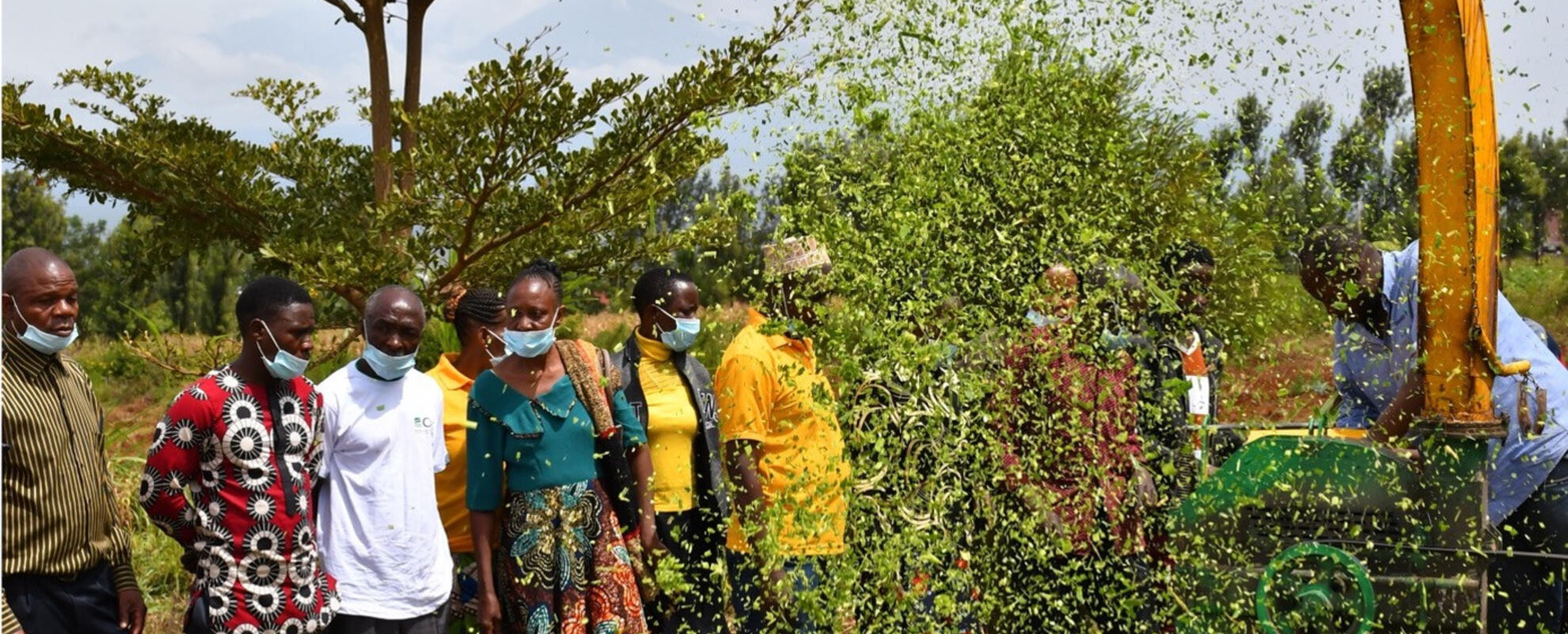
Agripreneurs in Tanzania can play a dynamic role in upgrading Tanzania’s smallholder dairy value chain
Boot camp noun a short, intensive, and rigorous course of training; also, a means to catalyse agripreneurs to adopt a package of technical products, innovations and services that can help dairy farmers in Tanzania boost their productivity.
The CGIAR Research Program (CRP) on Livestock, led by International Livestock Research Institute (ILRI) through its Maziwa Zaidi (MoreMilk) program, recently organized an intensive bootcamp for dairy agri-entrepreneurs (agripreneurs) in Tanzania as part of its efforts to upgrade and unlock the potential of the dairy sector.
Held from 24-30 August and from 6-12 September in Tanga and Kilimanjaro regions, the aim of the boot camp was to equip agripreneurs with existing businesses in breeding, animal health, feeding, extension, credit and milk sales with the technical, business and soft skills to help them grow their enterprises and better support the farmers they serve. They were taught financial literacy, communication, marketing and networking skills.
The agripreneurs were also shown the various business opportunities that could be derived from bundling and delivering to farmers integrated packages of proven dairy technologies from the Livestock CRP and other sources. Some of the prioritized technologies include Brachiaria grass, manure management, East Coast fever (ECF) vaccine, artificial insemination (AI) and other related animal husbandry or herd health management requirements.
The boot camps had a total of 66 participants, including 50 agripreneurs who were selected from Maziwa Zaidi pilot project sites. About 42% were women and 60% youth aged 19-35 years (31 from Kilimanjaro and 19 from Tanga) and included District Livestock and Fisheries Officers (DLFOs) from project districts and a consortium of facilitators/trainers from Livestock CRP partners in Tanzania.
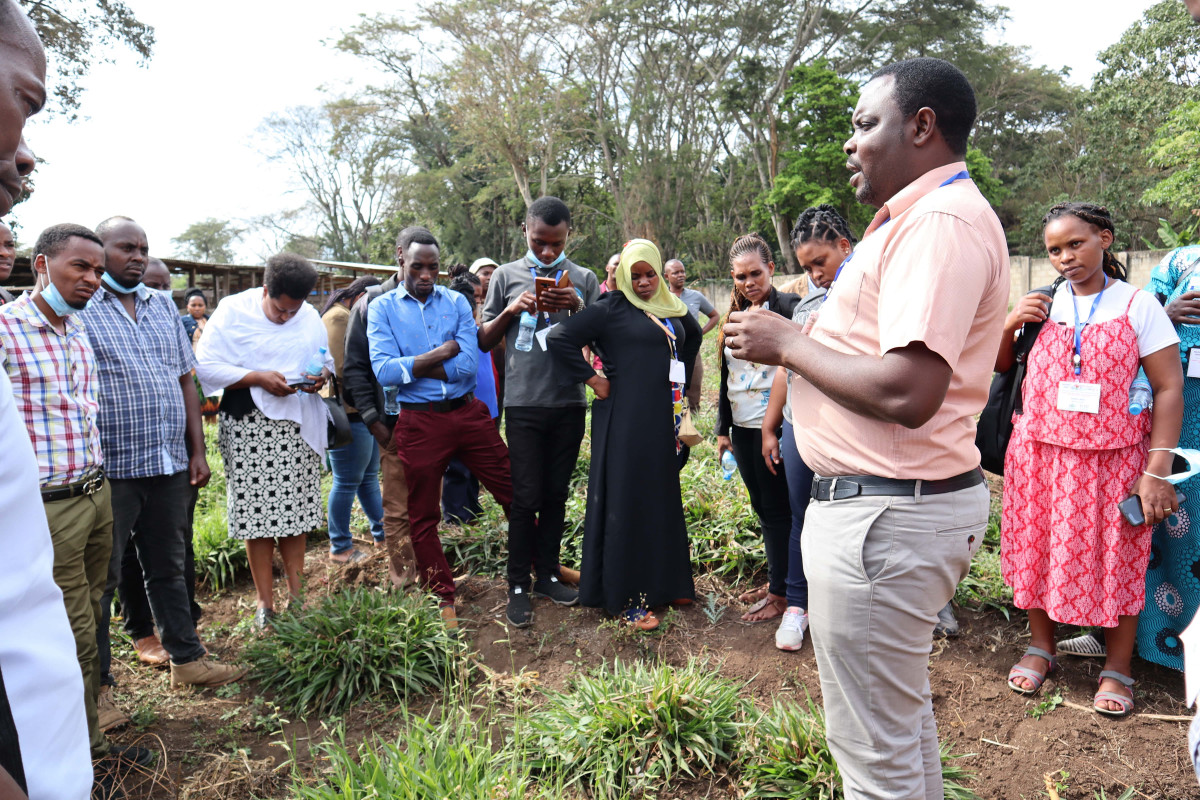 David Ngunga from the Alliance of Bioversity International and CIAT delivers a session on improved forage technologiesto dairy agripreneurs. Photo ILRI/G. Ndibalema
David Ngunga from the Alliance of Bioversity International and CIAT delivers a session on improved forage technologiesto dairy agripreneurs. Photo ILRI/G. Ndibalema
Agripreneurs excited about new business prospects
The boot camp training was well received, with trainees saying they learned a lot during the training modules and were excited about the new prospects that could help boost their agribusinesses.
Angelina Charles (52) is an agripreneur from Korogwe who started her business buying and selling milk after working at a dairy center in Tanga for more than 20 years. She highlighted inconsistencies in quality and quantity of milk supplied to her by dairy farmers’ as one of her biggest business challenges. She was keen to learn how she could address this challenge by creating awareness amongst farmers on milking hygiene and the appropriate feed options to increase milk supply.
“I now see that I need to meet with my dairy farmers to create awareness and persuade them to grow improved forages, especially the Brachiaria grass, to increase milk production. This will help expand my business as they will be able to provide me with the right quantity and quality of milk that I need,” she said.
Mary Mmary (41)–famously known as Mama Kaaya–together with her husband runs a family dairy processing business. They collect milk from smallholder dairy farmers, process yoghurt and cheese (Mozarella and Gouda) and sell milk to Tanga Fresh, a dairy processing company.
She believed the training would ‘lead to provision of better services to small-holder dairy farmers and increase their productivity.’ She decided she would teach her fellow farmers to conduct livestock farming as ‘a business.’
‘I know they can change traditional livestock keeping into a business. They simply lack the knowledge of how to do this,’ she said. ‘Ng’ombe ni kiwanda, mtunze akutunze!’ (A cow is like a factory, take care of it and it will take care of you).
Neema Mushi (55) is also a milk collector and retired chairperson of Kyeri Dairy Cooperative, who was interested in learning about Artificial Insemination (AI), noting how the technology can help to improve the breeds of cattle and prevent the transfer of sexually transmitted diseases among livestock. Neema is looking forward to networking with other agripreneurs to bundle a package of services to serve the smallholder dairy farmers in her community.
Learning from each other’s experiences
The training organizers asked agripreneurs to share their experiences as part of the learning process. These created enriching conversations aimed at encouraging adoption of new services.
Daniel Mtui is an AI service provider in the Kilimanjaro region. He was inspired to provide AI services from 2015 because he wanted to help farmers improve their dairy livestock breed for higher quality milk production.
“I receive a good income from this business, which enables me to provide for my family, including sending my children to good schools. Also, I have managed to improve the quality of dairy livestock of my community,” he said.
While Daniel noted the positive responses of farmers to the technology, he pointed out that the long distances he needs to travel to access the nitrogen liquid and semen increases the cost of AI procedures, which can prevent farmers who need the service from taking it up.
“Currently, we are working on creating groups like Savings and Credit Cooperative Societies (SACCOs) that will include the AI providers, ECF and milk producers. The groups will enable us to reach out and offer services to our customers more easily and effectively,” he said.
Elias Masasi (36) is a livestock officer from Handeni and a successful agripreneur who is making a good living delivering ECF vaccines. He spoke about the challenges he faces. “Most of the ECF vaccine suppliers do not deliver on time and this, to a large extent, has led to a slowdown in ECF service operations. My advice to government is to put in place a good strategy and policies to ensure the availability of ECF vaccine at all times to reduce livestock deaths and increase dairy productivity,” he said.
Field visits: from theory to practice
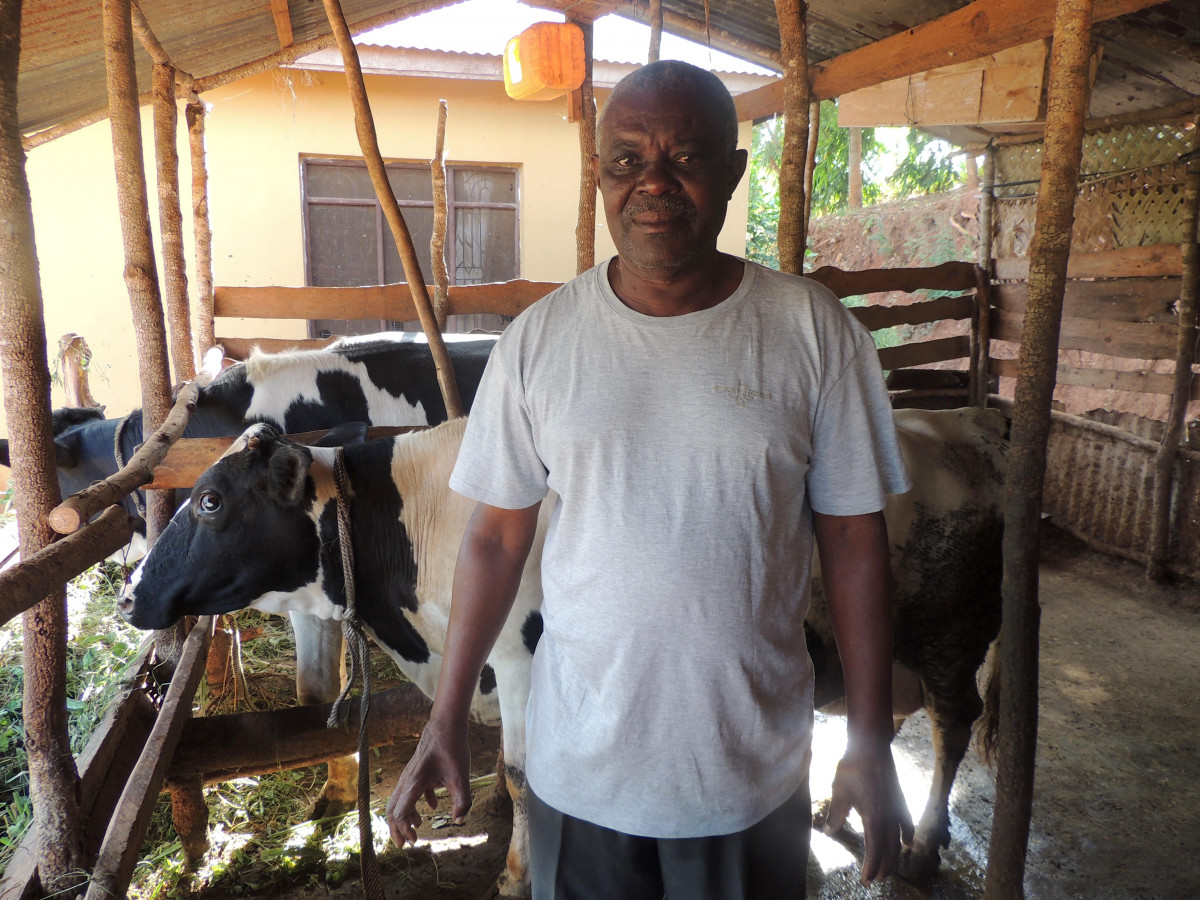 Participants from the Korogwe boot camp visited Msafiri Fanuel’s dairy farm to learn more about his cattle breeding activities and farming business. Photo ILRI/H. Rashidi
Participants from the Korogwe boot camp visited Msafiri Fanuel’s dairy farm to learn more about his cattle breeding activities and farming business. Photo ILRI/H. Rashidi
The boot camps involved field visits to reinforce the training participants received on the technologies. The trainees from the Korogwe boot camp visited the Tanzania Livestock Research Institute (TALIRI) campus to learn see first-hand the ongoing livestock and improved forage technologies for enhancing dairy productivity.
During the visit, the TALIRI research officer, Samwel Mngulu shared examples of the best forage varieties for livestock development. “Brachiaria grasses are important as they are drought tolerant, palatable and are highly yielding compared to other forages. They can survive in many areas and their production can reach 14 tons per acre per year,” Samuel said.
The Moshi bootcamp trainees, on the other hand, visited the Kilimanjaro Dairy Cooperative Joint Enterprise Limited (KDCJE), Kilimanjaro Environment Protection Initiatives (KEPI) premises to see demonstrations on manure management, feed production and Brachiaria forage farming.
“I am really impressed with the manure management – I did not know there was great value in manure. But now I will go and put more proper effort in managing manure. I will also add the production of improved forages as part of my service,’’ said Ombeni Uroki, 31, a silage service provider from Machame district after the visit.
“’My interest was on forage. I have gained new knowledge on improved forages, and I will educate my farmers about it so that they are able to increase their milk production at a much lower production cost compared to their present costs,’’ said Elizabeth Lema, a 35-year-old feed service provider from Hai district.
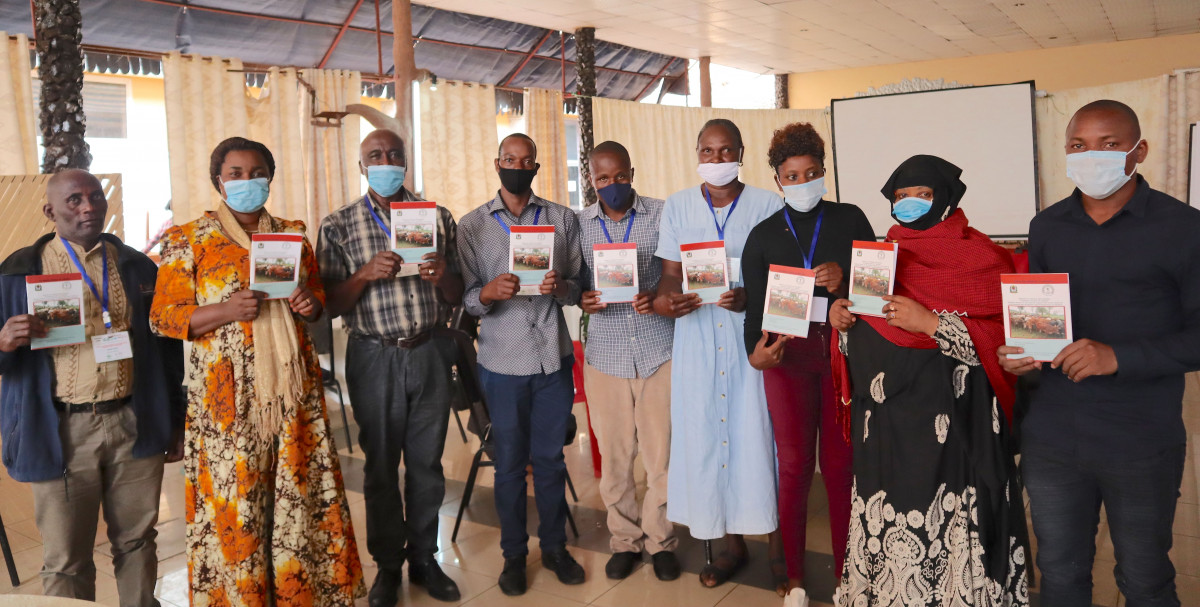 Participants at the Moshi boot camp with their training manuals on East Coast fever vaccination. Photo IITA_IRI/G. Ndibalema
Participants at the Moshi boot camp with their training manuals on East Coast fever vaccination. Photo IITA_IRI/G. Ndibalema
Next steps: business incubation and further training
Training facilitator from Sokoine University Graduate Entrepreneurs Cooperative (SUGECO) in Morogoro, Irene Faustine, believes that training was a necessary effort to spur initiatives that can contribute to better dairy productivity.
“Since most of the dairy input suppliers are also practitioners in the sector, I believe that not only will they use all technologies we promoted in their businesses to increase their income, they will also play a big role in linking livestock keepers and dairy farmers to these new services and technologies,” Irene said.
The bootcamp was organized as part of an incubation process to address the knowledge gaps and training needs earlier identified at a visioning workshop held in April/May 2021 to stimulate the agripreneurs’ thinking towards innovative and inclusive dairy agribusiness ideas and identify capacity gaps. A Lean Canvas approach was applied to deconstruct ideas, clarify customer segments, problems, solutions and unique value proposition. The bootcamp is being followed by mentoring and coaching for the agripreneurs to reinforce the learnings.
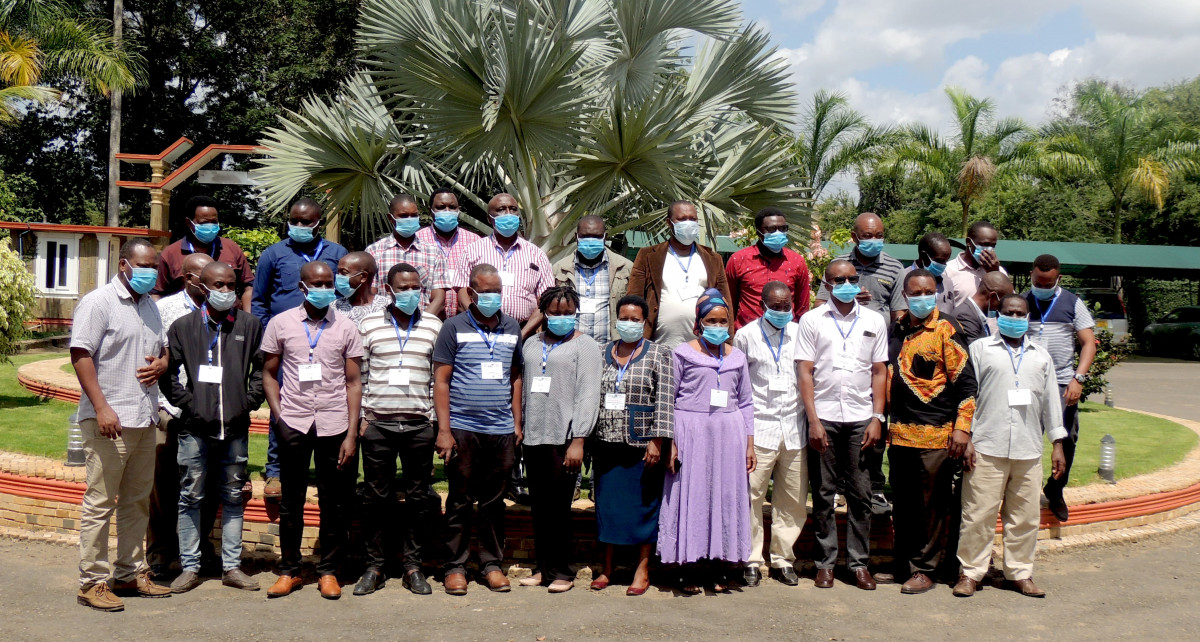 A group photo of the agripreneurs and trainers who attende the boot camp training at Korogwe. Photo ILRI/H.Rashidi
A group photo of the agripreneurs and trainers who attende the boot camp training at Korogwe. Photo ILRI/H.Rashidi
The boot camps were held as part of an incubation process under Maziwa Zaidi core Research for Development (R4D) project, “Agri-entrepreneurship, technology uptake and inclusive dairy in Tanzania”. The project is piloting scaling uptake of dairy technology packages by smallholder dairy producers delivered through empowered dairy agribusinesses.
The boot camps were delivered by a consortium of trainers led by Tanzania Career Development Consultancy Company (TACADECO) and involved Facilitating Change Tanzania (FACT), Kilimanjaro Dairy Cooperatives Joint Enterprise (JE); Ronheam International and SUGECO. Trainers from ILRI, Alliance Bioversity- CIAT (ABC) and Tanzania Livestock Research Institute (TALIRI) also joined to provide technical input on the prioritized innovations and bundling options.





